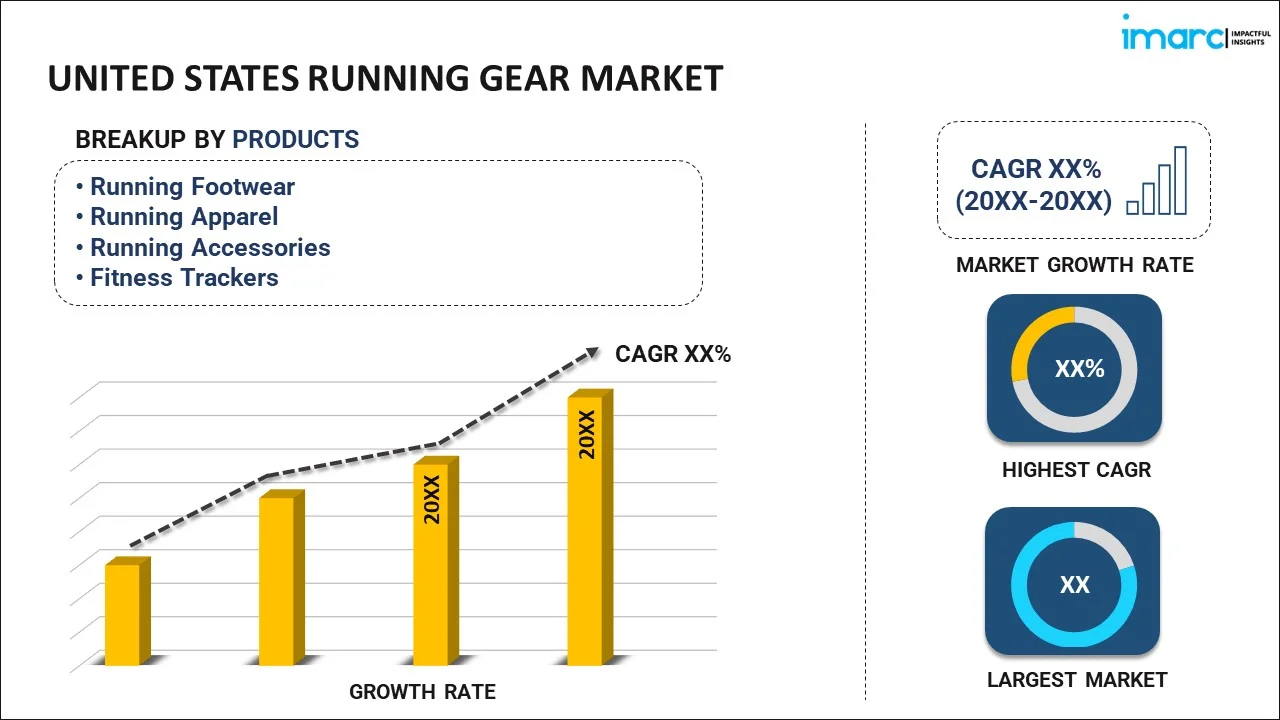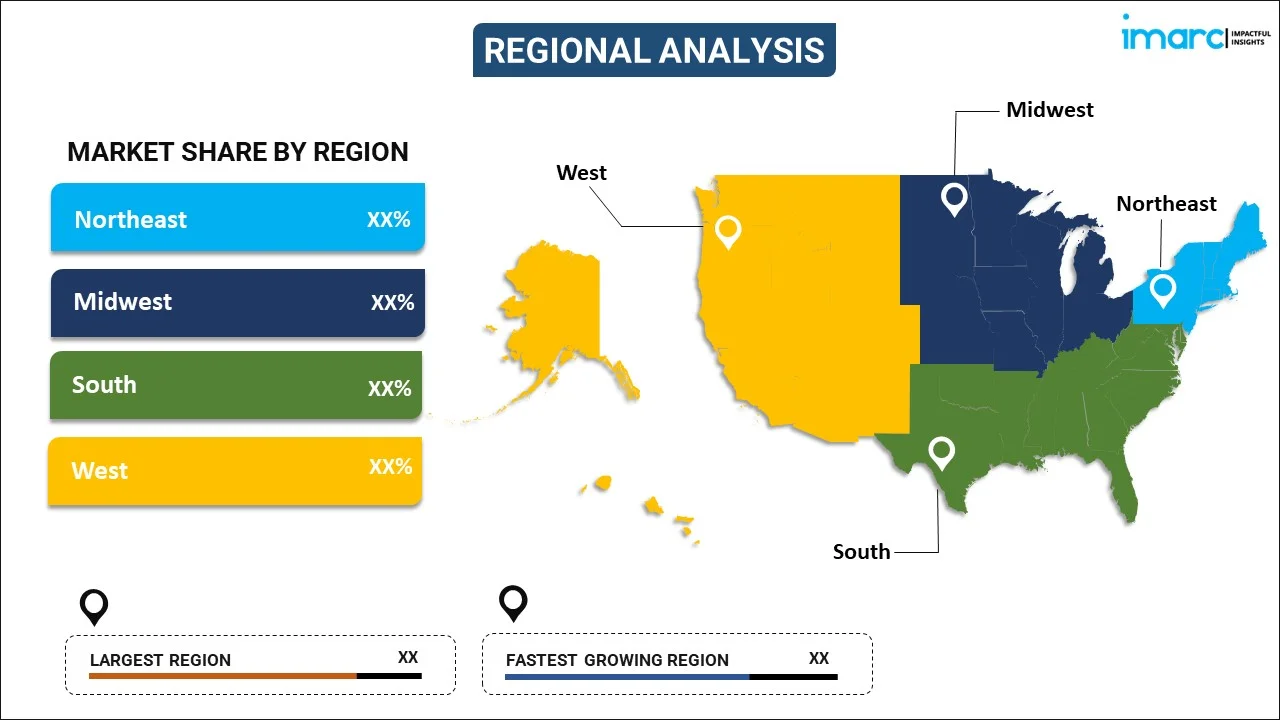
United States Running Gear Market Report by Product (Running Footwear, Running Apparel, Running Accessories, Fitness Trackers), Gender (Male, Female, Unisex), Distribution Channel (Specialty and Sports Shops, Supermarkets and Hypermarkets, Department and Discount Stores, Online, and Others), and Region 2025-2033
United States Running Gear Market Overview:
The United States running gear market size reached USD 12.9 Billion in 2024. Looking forward, IMARC Group expects the market to reach USD 19.2 Billion by 2033, exhibiting a growth rate (CAGR) of 4.31% during 2025-2033.
United States Running Gear Market Insights:
- Shoppers demand run gear that can easily be worn for both workouts and everyday occasions.
- Fashion-forward, performance-oriented clothing is transforming running gear design and anticipation.
- Celebrity endorsements enhance athleisure popularity within the fashion and fitness categories.
- Brands increasingly partner with designers to release limited-edition lifestyle-performance products.
- Adoption of running gear is migrating from gyms to everyday public settings.
|
Report Attribute
|
Key Statistics
|
|---|---|
|
Base Year
|
2024
|
|
Forecast Years
|
2025-2033
|
|
Historical Years
|
2019-2024
|
|
Market Size in 2024
|
USD 12.9 Billion |
|
Market Forecast in 2033
|
USD 19.2 Billion |
| Market Growth Rate 2025-2033 | 4.31% |
United States Running Gear Market Trends:
Athleisure and Lifestyle Convergence
The United States running gear market is increasingly characterized by the athleisure trend, which sees performance apparel wear serving as both functional wear for exercise and fashionable regular wear. Customers seek product that will deliver comfort, performance, and beauty, enabling them to move from exercise to social or casual occasions without needing to change clothes. As per the sources, in May 2024, Brooks Running unveiled "Let's Run There" in the United States, synchronizing running equipment with total wellness and extending appeal among various, health-oriented consumers in changing United States running gear market growth. Moreover, this has led to brands creating clothing and shoes that strike a balance between sporting performance and city style. Aspects such as comfortable materials, well-fitting garments, and streamlined silhouettes are equally as crucial to color trends and brand recognition. Influencers and celebrities are constantly marketing running apparel as part of style-conscious living, further dissolving the distinction between fashion and sportswear. Partnerships between sportswear brands and fashion designers have given rise to limited-edition releases that increase brand appeal. Consequently, running equipment is no longer relegated to gymnasiums—it's adopted in the workplace, schools, and public areas, transforming consumer attitudes and broadening the cultural significance of the market.
Increasing Focus on Sustainability and Green Materials
Sustainability has emerged as a significant force behind consumer decision in the United States running gear market trends. Consumers are highly eco-aware and anticipate brands being responsible in the production and disposal of products. Accordingly, companies are reaching for recycled, plant-based, and organic resources for shoes, clothing, and accessories. Solutions go beyond raw materials—numerous brands are embracing green packaging, minimizing water usage during production, and creating equipment that lasts. Initiatives like take-back programs, resale platforms, and product recycling systems are picking up speed, facilitating circular consumption patterns. Sourcing transparency, manufacturing ethics, and carbon footprint disclosure are also assisting brands in speaking with eco-conscious consumers. As the trend for sustainability keeps accelerating, brands that do not pay attention to these demands risk being left behind. Sustainable design is no longer an niche option—it is now standard practice, an expression of evolving values and building confidence with a new generation of value-conscious consumers.
Personalization and Performance-Enhancing Technology
Customized performance apparel is revolutionizing the United States running gear market share. Runners increasingly anticipate product tailored to their personal biomechanics, fitness level, and competitive goals. Emerging technologies such as motion sensors, 3D foot scanning, and gait analysis are being used in both physical and digital stores so that consumers can locate the most fitting shoes and supportwear. For instance, in April 2024, ‘On’ premiered LightSpray technology in the United States, pioneering running equipment with a robot, one-step upper utilized in the Cloudboom Strike LS for superior performance. Furthermore, intelligent running shoes that pick up on real-time information and link to training apps are becoming popular, enabling users to adjust their stride, pace, and method. Moreover, artificial intelligence (AI) driven virtual coaching, custom insoles, and compressive clothing that can be adjusted are improving athletic performance and mitigating injury risk. Wearable technology is also being integrated into apparel, allowing dynamic tracking of body temperature and muscle recruitment. All of these technologies provide a data-intensive, feedback-rich training environment that benefits both competitive athletes and the weekend warrior. As the need for personalized and technology-infused gear increases, companies are spending big on innovation to stay ahead in the competitive game.
United States Running Gear Market Growth Driver:
The United States running equipment market forecast indicates steady growth, driven by growing health awareness and heightened involvement in fitness. Consumers of all ages are adopting running as a sport, yes, but also as an integral part of an active way of life. Urbanization, better access to fitness facilities, and an expanding marathon culture and fun-run race culture are supporting this phenomenon. Furthermore, the synergy between performance, comfort, and fashion in sports equipment has expanded consumer demand. Running shoes and clothing are not only used for training anymore, but they also now occupy a central position in everyday attire, aided by the popularity of athleisure. Advances in fabric technology, cushioning, and injury protection are also driving product demand among non-professional and professional users. Additionally, the online fitness ecosystem, such as apps and virtual coaching platforms, is driving greater interaction with runners in search of customized experiences. Cumulatively, all these are driving consumer expenditures and brand loyalty in the running equipment segment.
United States Running Gear Market Challenge:
The United States running gear market is although dynamic and expanding, beset by a number of subtle issues that must be navigated with care. Market saturation is one such issue, with many brands providing similar gear, making it ever more challenging for new players or smaller businesses to differentiate themselves. Moreover, achieving a balance between fashion and performance can be tricky, particularly when responding to the varied consumer needs across fitness levels and lifestyle. Sustainability, whilst immensely popular, carries heavier production costs and logistical issues that are not always easy to absorb without impacting price. Further, rapid technology shifts require ongoing investment in research and development, which can be capital-intensive. Supply chain disruptions and volatile material prices also present operational challenges. Finally, consumer tastes are changing with lightning speed, driven by social trends and digital activism, so that brands will need to stay nimble and responsive. Meeting these challenges with careful innovation and transparency will be necessary for long-term United States running gear market and viability.
Key Market Segmentation:
IMARC Group provides an analysis of the key trends in each sub-segment of the United States running gear market report, along with forecasts at the country and regional level from 2025-2033. Our report has categorized the market based on product, gender and distribution channel.
Breakup by Product:

To get more information on this market, Request Sample
- Running Footwear
- Running Apparel
- Running Accessories
- Fitness Trackers
Breakup by Gender:
- Male
- Female
- Unisex
Breakup by Distribution Channel:
- Specialty and Sports Shops
- Supermarkets and Hypermarkets
- Department and Discount Stores
- Online
- Others
Breakup by Region:

- Northeast
- Midwest
- South
- West
Competitive Landscape:
The competitive landscape of the industry has also been examined along with the profiles of the key players.
Recent News and Developments:
- In February 2025, NIKE, Inc. and SKIMS introduced NikeSKIMS, a new brand that brings together Nike's innovation in sport and SKIMS' body-informed design. With a mission of inclusivity, performance, and fashion, the brand's initial U.S. collection launches in spring 2025 in selected retail stores and online, with expansion into international markets set to begin in 2026.
- In July 2024, Swiss sportswear company On released the Prism Capsule Collection in the United States, which included high-performance styles such as the Cloudboom Strike and Cloudspike series. Combining cutting-edge innovation with bold design, the collection adds a premium touch to the United States running apparel market aimed at top athletes and fashion-conscious runners.
Report Coverage:
| Report Features | Details |
|---|---|
| Base Year of the Analysis | 2024 |
| Historical Period | 2019-2024 |
| Forecast Period | 2025-2033 |
| Units | Billion USD |
|
Scope of the Report
|
Exploration of Historical and Forecast Trends, Industry Catalysts and Challenges, Segment-Wise Historical and Predictive Market Assessment:
|
| Products Covered | Running Footwear, Running Apparel, Running Accessories, Fitness Trackers |
| Genders Covered | Male, Female, Unisex |
| Distribution Channels Covered | Specialty and Sports Shops, Supermarkets and Hypermarkets, Department and Discount Stores, Online, Others |
| Regions Covered | Northeast, Midwest, South, West |
| Customization Scope | 10% Free Customization |
| Post-Sale Analyst Support | 10-12 Weeks |
| Delivery Format | PDF and Excel through Email (We can also provide the editable version of the report in PPT/Word format on special request) |
Key Questions Answered in This Report
The United States running gear market was valued at USD 12.9 Billion in 2024.
The United States running gear market is projected to exhibit a CAGR of 4.31% during 2025-2033, reaching a value of USD 19.2 Billion by 2033.
Key challenges in the United States running gear market include market saturation, making brand differentiation difficult, and balancing performance with lifestyle appeal. Sustainability efforts raise production costs, while rapid tech evolution demands heavy R&D investment. Additionally, supply chain issues and fast-changing consumer preferences create pressure to innovate quickly and consistently.
Need more help?
- Speak to our experienced analysts for insights on the current market scenarios.
- Include additional segments and countries to customize the report as per your requirement.
- Gain an unparalleled competitive advantage in your domain by understanding how to utilize the report and positively impacting your operations and revenue.
- For further assistance, please connect with our analysts.
 Request Customization
Request Customization
 Speak to an Analyst
Speak to an Analyst
 Request Brochure
Request Brochure
 Inquire Before Buying
Inquire Before Buying




.webp)




.webp)












